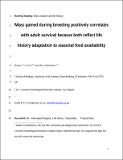Mass gained during breeding positively correlates with adult survival because both reflect life history adaptation to seasonal food availability
Abstract
Both mass (as a measure of body reserves) during breeding and adult survival should reflect variation in food availability. Those species that are adapted to less seasonally variable foraging niches and so where competition dominates during breeding, will tend to have a higher mass increase via an interrupted foraging response, because their foraging demands increase and so become more unpredictable. They will then produce few offspring per breeding attempt, but trade this off with higher adult survival. In contrast, those species that occupy a more seasonal niche will not gain mass because foraging remains predictable, as resources become superabundant during breeding. They can also produce more offspring per breeding attempt, but with a trade-off with reduced adult survival. We tested whether the then predicted positive correlation between levels of mass gained during seasonal breeding and adult survival was present across 40 species of tropical bird measured over a 10-year period in a West African savannah. We showed that species with a greater seasonal mass increase had higher adult survival, controlling for annual mass variation (i.e. annual variation in absolute food availability) and variation in the timing of peak mass (i.e. annual predictability of food availability), clutch size, body size, migratory status and phylogeny. Our results support the hypothesis that the degree of seasonal mass variation in birds is probably an indication of life history adaptation: across tropical bird species it may therefore be possible to use mass gain during breeding as an index of adult survival.
Citation
Cox , D & Cresswell , W 2014 , ' Mass gained during breeding positively correlates with adult survival because both reflect life history adaptation to seasonal food availability ' , Oecologia , vol. 174 , no. 4 , pp. 1197-1204 . https://doi.org/10.1007/s00442-013-2859-5
Publication
Oecologia
Status
Peer reviewed
ISSN
0029-8549Type
Journal article
Rights
© Springer-Verlag Berlin Heidelberg 2014. The final publication is available at Springer via http://dx.doi.org/10.1007/s00442-013-2859-5
Collections
Items in the St Andrews Research Repository are protected by copyright, with all rights reserved, unless otherwise indicated.

